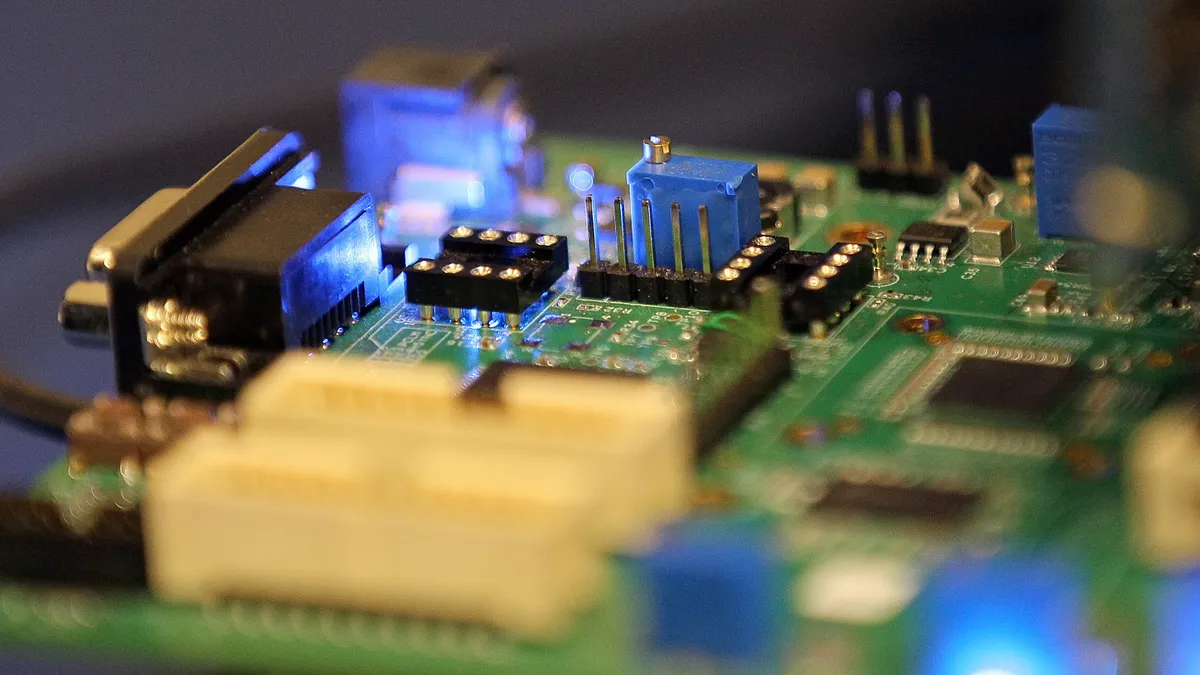Dive Brief:
- Multiple automakers have adjusted their supplier relationships and boosted transparency in the face of a semiconductor shortage that's hampered production for months. But these steps haven't been enough to hold off production stoppages.
- General Motors CEO Mary Barra said "the situation does remain fluid," but added that the company was working directly with suppliers in an attempt to increase the transparency the manufacturer has into the semiconductor supply chain.
- Similarly, Ford CEO Jim Farley said the company was working directly with semiconductor fabs, the first tier in the semiconductor supply chain. "With closer relationships and more transparent exchange of information, such as technology roadmaps, we can integrate their know-how into our designs to better align supply and demand," Farley said.
Dive Insight:
Automakers are shuffling their operations and working more closely with suppliers, as the industry expects the impacts of the semiconductor shortage to extend into next year.
"Regarding the total market of calendar 2022, we expect the demand to stay steady with the residual impact of semiconductor shortages," Honda Executive Vice President Seiji Kuraishi said earlier this month.
Kuraishi said Honda is taking multiple steps to try to mitigate the impact of the semiconductor shortage, including speaking with several vendors to get supplies in more than one location.
"We will try to keep appropriate level of the stocks inventories for different parts ... so the impact on the production is minimized," Kuraishi said.
McKinsey noted in May that OEMs' efforts to provide greater transparency into suppliers included standing up dashboards to combine data in demand from the manufacturer and the committed supply that they had secured.
"The use of analytics to match supply with demand helps reduce a cumbersome and error-prone manual effort," McKinsey noted. "The goal is to provide clear input for internal communication and for communication to suppliers and customers."
Farley noted the transparency goes both ways. Ford provides "longer-term forecast to critical vendors so they can better understand and accommodate our requirements," he said.
Even as companies work to improve transparency, visibility remains an issue.
"The problem that we all have is that, the measurement of the magnitude of the headwind coming from the semiconductor is not great," Stellantis CEO Carlos Tavares said earlier this month. The situation isn't expected to worsen in the back half of the year, but it's hard to predict if lockdowns or other events will setback the supply further.
Nissan CEO Makoto Uchida said the automaker had felt the impact of the shortage in the most recent quarter but was able to manage the semiconductor supply chain fairly successfully. Uchida didn't expand on the tactics used to manage the supply chain. But on the company's Q1 call late last month, Uchida said Q2 would be more challenging.
"For the semiconductor supply, Q2 is where we will be hit the largest," Uchida said. "Needless to say, our inventories ... have decreased largely, so we need to manage this smartly."
Less than two weeks after these comments, Nikkei reported that Nissan suspended operations in the U.S. due to semiconductor shortages. And Toyota is the latest company to announce production impacts with the manufacturer planning to slash output in Japan by 40% as a result of the shortage, according to The Wall Street Journal.
Lordstown Motors Chairperson Angela Strand said last week that the shortage of semiconductors resulted in "enormous production challenges" but didn't elaborate.
As companies shift procurement and operations as a result of the shortage, suppliers have taken notice. NXP Semiconductors said automakers will take a step away from just-in-time inventory management of semiconductors following these challenges.
But some automakers have suggested the opposite, and that they could double down on their just-in-time philosophies. Ford CFO John Lawler said earlier this year that a supply chain revamp will allow dealerships to hold smaller inventories while instead using an ordering process for purchases.
In May, the consulting firm AlixPartners estimated the semiconductor shortage would result in $110 billion in lost revenues for automakers this year. A spokesperson for the firm said the estimate remains the same.
This story was first published in our weekly newsletter, Supply Chain Dive: Procurement. Sign up here.














